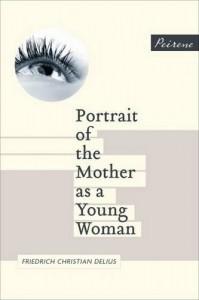 A novel in a single sentence. That was what intrigued me about this book. To be honest I generally avoid World War Two books – not because I don’t think it’s important, but just because I feel as if I have already overdosed on books, films, TV programmes etc etc exploring every angle of the war, and I’d need a really good reason to read about that again, rather than any of the infinite number of other places and times. The innovative narrative structure gave me that reason.
A novel in a single sentence. That was what intrigued me about this book. To be honest I generally avoid World War Two books – not because I don’t think it’s important, but just because I feel as if I have already overdosed on books, films, TV programmes etc etc exploring every angle of the war, and I’d need a really good reason to read about that again, rather than any of the infinite number of other places and times. The innovative narrative structure gave me that reason.
It turns out, however, that it’s not really a single sentence. I mean, it’s true that there are no full-stops, but the sentence doesn’t really run on continuously for the whole book. In some places it does, but in many others the sentence basically ends, and the author goes on to a new thought in a new paragraph, just using a comma instead of a full-stop. For example, from a page opened at random:
…this sort of thing happened more often in Catholic countries, he had written, but she had been right to get off the bus straight away,
since that incident she had kept as far away from crowds as possible….
The phrase “Since that incident” should really be a new sentence – it’s a new thought, and there’s a grammatical break between it and what went before. The whole one-sentence thing quite quickly began to feel like a bit of a cheat.
But as I read the book more, the style grew on me. I began to think about why he had written it in this way, and realised it’s not just a gimmick – it’s a clever reflection of the way we think. The whole book is an interior monologue of a woman walking to church one day in 1943, and her thoughts meander around between present and past with a mesmerising fluidity. And this, really, is how we think when we’re just walking along letting our thoughts wander. I went for a long walk on Hampstead Heath recently and did exactly the same thing. There was no break between the thoughts, no division between one thing and the next. Past, present and future all merged in my head, and I went from one thing to the next without a break or logical transition.
By the end of the book I was convinced that writing in a single sentence was an effective way of communicating this fluidity of thought processes. It’s true that it’s not technically a single sentence, but I suppose the only way to write for 125 pages in a single sentence would be to clutter up the book with a whole lot of ugly conjunctions. Maybe just having a comma and moving on to the next thing was the best way to do it.
The character interested me as well. She is very young, very innocent, very trusting, quite careful to avoid thinking about things she doesn’t understand or want to think about, quite happy to trust in God or her husband or some other authority to work things out for her. She is wary of her friend Ilse, who raises uncomfortable questions such as why it was necessary to hate the British and Americans – just the question itself makes her feel “guilty, confused and horrified” and she decides to distance herself from Ilse or “at the very least stop getting into discussions with her”. Another revealing passage, after saying she needed to discuss “her Jewish thoughts” with Gert:
On her own she could not work out what you were allowed and not allowed to say, what you should think and what you ought not to think, and how to cope with her ambivalent feelings, all she could do was to keep these things to herself until his return
There is a clear link between her religion and subservience – for her, religion is about faith to the point of fatalism, accepting God’s will and not questioning anything, the effort “to bring your own will into harmony with the will of God, and thereby find the greatest freedom in obedience”.
It’s clear to see how this young woman, clearly a good person with a kind heart, would fall perfectly into line with the crimes of the Nazi government. By doing good she would be complicit in evil. It’s a very compelling characterisation. This is the third book published by Peirene Press, and all three have been of a very high standard. Personally I’d recommend Beside the Sea as my favourite, but this book is also well worth a read.



There are 2 comments
My thoughts exactly, though I have a nasty feeling you’ve expressed them better.